Coronavirus: Medical waste piles up at the epicentre of Italy's outbreak

Contaminated waste is piling up in hospitals at the epicentre of the coronavirus crisis in Italy due to the number of patients being treated.
Medics at the Cremona hospital in the northern Lombardy region say the enormous surge in the number of patients since March has made the issue of safe disposal particularly difficult.
Staff must be trained to properly handle everything from sheets and masks to syringes - standard hospital items now laced with added danger in a pandemic caused by a new and still unexplored disease.
"Compared to the time before the pandemic, the amount of potentially infectious waste has doubled or nearly tripled," the hospital's waste management director Maria Rosaria Vino told AFP.
The virus has officially killed around 27,000 in Italy.
Its spread is slowing, and the country's leaders are preparing to gradually lift some of the strictest confinement measures from May 4th.
READ ALSO: 'Phase two starts now': What's Italy's plan for life after lockdown?
But the mood at the Cremona hospital remains tense.
"The risk is increased because we handle potentially infectious waste," said Luciano Masseroni, a waste operator. "We collect the waste from various services, but we do not know which ones they are."

The waste is now sealed in plastic bags and stored in a separate room to prevent airborne particles from spreading across hospital halls.
The bags are then boxed and hermetically sealed, their contents labeled on the outside. The boxes are eventually packed onto carts and sent for removal in sealed metal containers.
All the waste is evacuated by freight elevator and a special passageway to it in the hospital basement.
None of it can spend more than five days waiting to be shipped out by subcontractors.
READ ALSO:
-
-
-
"We have trained disposal teams to wear all the protective equipment. They do not face any added risk," hospital medical director Lorenzo Cammelli said.
"The transport officials find the containers already sealed. There is no additional risk for them either."
But caution is on everyone's mind.
Nurse Omar Semlali is one of the first to handle the equipment - and the first to start the process of its removal.
“The disposal containers fill very quickly and the most important thing is not to overstuff them because then they do not close properly," Semlali said. "We are particularly careful making sure that they are properly sealed."
Comments
See Also
Medics at the Cremona hospital in the northern Lombardy region say the enormous surge in the number of patients since March has made the issue of safe disposal particularly difficult.
Staff must be trained to properly handle everything from sheets and masks to syringes - standard hospital items now laced with added danger in a pandemic caused by a new and still unexplored disease.
"Compared to the time before the pandemic, the amount of potentially infectious waste has doubled or nearly tripled," the hospital's waste management director Maria Rosaria Vino told AFP.
The virus has officially killed around 27,000 in Italy.
Its spread is slowing, and the country's leaders are preparing to gradually lift some of the strictest confinement measures from May 4th.
READ ALSO: 'Phase two starts now': What's Italy's plan for life after lockdown?
But the mood at the Cremona hospital remains tense.
"The risk is increased because we handle potentially infectious waste," said Luciano Masseroni, a waste operator. "We collect the waste from various services, but we do not know which ones they are."

The waste is now sealed in plastic bags and stored in a separate room to prevent airborne particles from spreading across hospital halls.
The bags are then boxed and hermetically sealed, their contents labeled on the outside. The boxes are eventually packed onto carts and sent for removal in sealed metal containers.
All the waste is evacuated by freight elevator and a special passageway to it in the hospital basement.
None of it can spend more than five days waiting to be shipped out by subcontractors.
READ ALSO:
"We have trained disposal teams to wear all the protective equipment. They do not face any added risk," hospital medical director Lorenzo Cammelli said.
"The transport officials find the containers already sealed. There is no additional risk for them either."
But caution is on everyone's mind.
Nurse Omar Semlali is one of the first to handle the equipment - and the first to start the process of its removal.
“The disposal containers fill very quickly and the most important thing is not to overstuff them because then they do not close properly," Semlali said. "We are particularly careful making sure that they are properly sealed."
Join the conversation in our comments section below. Share your own views and experience and if you have a question or suggestion for our journalists then email us at [email protected].
Please keep comments civil, constructive and on topic – and make sure to read our terms of use before getting involved.
Please log in here to leave a comment.